 |
VO-BB - 20 YEARS OLD!
Established November 10, 2004
|
| View previous topic :: View next topic |
| Author |
Message |
Ed Fisher
DC
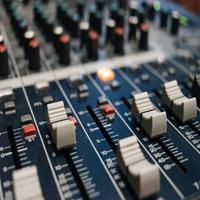
Joined: 05 Sep 2012
Posts: 605
Location: East Coast, U.S.A.
|
 Posted: Fri Apr 04, 2014 9:21 am Post subject: DIGITAL RECORD LEVELS Posted: Fri Apr 04, 2014 9:21 am Post subject: DIGITAL RECORD LEVELS |
 |
|
I came across this video some time ago, but only re-discovered it today. In it this fellow makes the case for not recording digitally any hotter than -12 to -18db. He makes a persuasive argument and explains why, but I would be interested in this boards thoughts on the subject.
https://www.youtube.com/watch?v=O0VVWHjV130
_________________
"I reserve the right to be completely wrong." |
|
| Back to top |
|
 |
Jason Huggins
The Gates of Troy
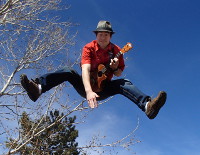
Joined: 12 Aug 2011
Posts: 1846
Location: In the souls of a million jeans
|
 Posted: Fri Apr 04, 2014 9:38 am Post subject: Posted: Fri Apr 04, 2014 9:38 am Post subject: |
 |
|
Point well made. Unfortunately, media producers will raise the gain in the digital realm to around -3db regardless of what you send them (and may even complain that your signal is to quiet).
That would be no big deal if all noise levels didn't change. I did, however, do a test to see how recording at a lower level would affect your noise level and the result was this: If you record at a lower level, your equipment noise is the same as if you record at a higher level. This means (for comparison only, these aren't real numbers) if your equipment adds 15db of noise to your signal, and you record at -6db (or -3db) and then don't boost your signal, you end up with 15db of noise (from your equipment). If you record at -16db, and then boost your signal to -6db, your equipment will at 15db of noise (at -16db original recorded level) and then when you boost the db by 10, it boosts your noise by 10db.
Now I know that these aren't real numbers, that the db scale isn't really linear, that your equipment introduces different levels of noise at different gain levels and so on and so on. BUT, when I did an actual recorded test, there was more noise in the signal that was boosted to -6db vs the signal that was recorded at -6db in the first place.
You'd have to change the entire industry mindset to apply that science. He seems correct in his test though! |
|
| Back to top |
|
 |
Bish
3.5 kHz
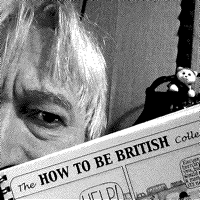
Joined: 22 Nov 2009
Posts: 3738
Location: Lost in the cultural wasteland of Long Island
|
 Posted: Fri Apr 04, 2014 11:28 am Post subject: Posted: Fri Apr 04, 2014 11:28 am Post subject: |
 |
|
Sorry, but that was a whole bunch of techno-babble bs (IMHO).
His telling points were:
Over-driving the analogue stage &
This excellent little Behringer mixer.
Stop thinking analogue where it starts to get "characteristic" in the amber, and distorted in the red. Ignoring the noise issues, a signal recoded at -3dB is fundamentally the same as one recorded at -18dB and then wound up. However, turn it up by 15dB... and you're turning up the noise as well. The important issue is the s/n ratio. This isn't so much the room noise (which I accept will be recorded at the lower level as well), but inherent equipment noise.
The most important thing about recording digital is simply keep the levels up and don't clip. Clipping is a hard wall, unlike analogue where you can drift into distortion through a (some say desirable) saturation phase.
I'm now putting on my tin-hat... I know this is a contentious issue. But the guy's argument was just not good. Oh, the power of the internet... everyone has a voice.
_________________
Bish a.k.a. Bish
Smoke me a kipper... I'll be back for breakfast.
I will not feed the trolls... I will not feed the trolls... I will not feed the trolls... I will not feed the trolls. |
|
| Back to top |
|
 |
vkuehn
DC
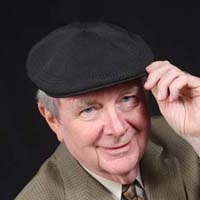
Joined: 24 Apr 2013
Posts: 688
Location: Vernon now calls Wisconsin home
|
 Posted: Fri Apr 04, 2014 8:36 pm Post subject: Re: DIGITAL RECORD LEVELS Posted: Fri Apr 04, 2014 8:36 pm Post subject: Re: DIGITAL RECORD LEVELS |
 |
|
| Clutter Ash wrote: |
I came across this video some time ago, but only re-discovered it today. In it this fellow makes the case for not recording digitally any hotter than -12 to -18db. He makes a persuasive argument
|
Horse-feathers! Different pieces of equipment are designed to accept input at differing levels. His illustration did not prove that the analog equipment was being driven at its optimum input level, and did not prove that the digital converter was being driven at its optimum input level. |
|
| Back to top |
|
 |
Ed Fisher
DC

Joined: 05 Sep 2012
Posts: 605
Location: East Coast, U.S.A.
|
 Posted: Fri Apr 04, 2014 11:08 pm Post subject: Posted: Fri Apr 04, 2014 11:08 pm Post subject: |
 |
|
Hmmm.
Well, there does seem to be a consensus forming here.
I suppose it goes back to "If it sounds good, it is good."
Regardless of any theories or measurements anyone makes.
Good to know.
_________________
"I reserve the right to be completely wrong." |
|
| Back to top |
|
 |
georgethetech
The Gates of Troy

Joined: 18 Mar 2007
Posts: 1878
Location: Topanga, CA
|
 Posted: Sat Apr 05, 2014 2:37 am Post subject: Posted: Sat Apr 05, 2014 2:37 am Post subject: |
 |
|
If all in the analog stage is set optimally, it won't make a big difference to the audio quality whether you record at -18 or -3, but if you are going to be "lazy" with the digital levels to avoid clipping, record at 24bit because once the audio is normalized back to 0dB in mastering the noise won't increase as much as when recorded at 16bit.
_________________
If it sounds good, it is good.
George Whittam
GeorgeThe.Tech
424-226-8528
VOBS.TV Co-host
TheProAudioSuite.com Co-host
TriBooth.com Co-founder |
|
| Back to top |
|
 |
ccpetersen
With a Side of Awesome

Joined: 19 Sep 2007
Posts: 3708
Location: In Coherent
|
 Posted: Sat Apr 05, 2014 4:14 pm Post subject: Posted: Sat Apr 05, 2014 4:14 pm Post subject: |
 |
|
So, back in the day, I took some signal processing courses in grad school (long story), and we practiced doing exactly this problem. And, proved to ourselves that it's better to record at a higher level, (say -6 dB digitally) and use that, than it is to record at -16 dB and then up the gain. The increase in noise is immediately obvious.
Of course, we were playing with signals to be sent over POTS, satellite relay, and so on. But, the principle was obvious once we did the test a few times for ourselves.
SOOOOOoooo... I am in the "set it higher" crowd, rather than the "set it lower and boost it in processing"... yeah, I know we all say (or hear an engineer say), "We'll fix it in the mix" but that doesn't always work out like you thought it would either. 
George, I'll have to try that 24-bit solution.
_________________
Charter Member: Threadjackers Local 420 |
|
| Back to top |
|
 |
chrisvoco
Club 300
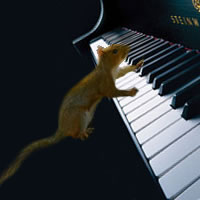
Joined: 14 Mar 2014
Posts: 380
Location: Local
|
 Posted: Sun Apr 06, 2014 11:01 pm Post subject: Posted: Sun Apr 06, 2014 11:01 pm Post subject: |
 |
|
The dude in the video never shows us how his little mixer and his computer's a/d are calibrated. The whole thing is mostly meaningless because of that. Even though the youtube post includes a reference to wiki about dbfs and dbu, he does a good job of avoiding any indication he understands that.
You could pipe in an analog signal at *any level* and make it show up at *any level* in your DAW - and you could probably take your choice of several stages of gain at which to do that at your console, at the trim on your audio interface, etc. You could make a whisper-quiet analog signal hot enough to light your cigarette right after conversion, or you could take a terribly overmodulated signal and have it register just above your noise floor (and if you want to have both of those happen simultaneously, you'll get something with automatic gain control and suddenly be programming a Top 40 station).
There is no standard to compare dBu and dbFS.
Without calibration details, you are comparing your dirty socks to scrambled eggs.
If you don't calibrate, be sure to color your wires with a green marker, so the extra bits on your reverb tails don't fall out.
Here's a nifty set of formulae, calculators and explanations - page layout is horrendous, but readable: http://www.sengpielaudio.com/calculator-db-volt.htm
_________________
Finally, Ford stops starting to say things and starts. |
|
| Back to top |
|
 |
chrisvoco
Club 300

Joined: 14 Mar 2014
Posts: 380
Location: Local
|
 Posted: Sun Apr 06, 2014 11:25 pm Post subject: Posted: Sun Apr 06, 2014 11:25 pm Post subject: |
 |
|
This note from the folks at Rane has a more readable explanation - the page I referenced earlier has a link to it, but it's buried:
http://www.rane.com/note169.html
The relevant part is about midway through, titled "What About dBFS?"
_________________
Finally, Ford stops starting to say things and starts. |
|
| Back to top |
|
 |
|
|
You cannot post new topics in this forum
You cannot reply to topics in this forum
You cannot edit your posts in this forum
You cannot delete your posts in this forum
You cannot vote in polls in this forum
|
Powered by phpBB © 2001, 2005 phpBB Group
|



